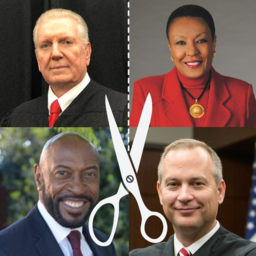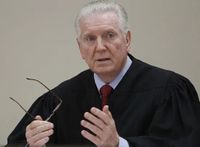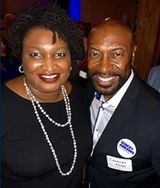Political Adversaries Cut From the Same Cloth
Brantley Embraces Judicial Activism for Retirement Plan
Cobb County Senior Judge, Grant Brantley, challenged Justice Leah Ward Sears in 2004 for her seat on the Georgia Supreme Court bench in what was thought by some to be “the most expensive and high-profile court [election] in state history.”[1] Brantley's mantra at the time was that “[he] will interpret the law” and “[he] will not legislate.”[2] In an article published with Thomasville Times-Enterprise, written by Mark Lastinger, Brantley insisted that his opponent (Sears) was a “judicial activist” and that he and Sears were “different as night and day.”[3] But now, in recent years, both Sears and Brantley show that they were cut from the same cloth—Brantley turning toward judicial activism for his money-making retirement plan.[4] So what exactly is “judicial activism” and what makes Brantley a judicial activist?
Judicial activism is a judicial philosophy holding that the courts can and should go beyond the applicable law to consider broader societal implications of its decisions. It is sometimes used as an antonym of judicial restraint. The term usually implies that judges make rulings based on their own views rather than on precedent.[5]
- The term judicial activism is sometimes summarized as "legislating from the bench."[6]
In another article published with The Moultrie Observer by Lori Glenn, while on the campaign trail against Sears, Judge Brantley stated that “I assure you I have enforced laws that I didn’t particularly care for, because that was my job . . . . When I get there, I will not legislate. I will interpret the law.” Despite Brantley’s anti-activist mantra, his escapades as a retired, part-time Senior Judge show otherwise.[7]
Brantley In Retirement
Judge Grant Brantley served as Cobb County Superior Court judge from 1980 to 1992. "He didn't seek reelection in 1992 because he was in the process of being nominated to the U.S. District Court by President George H. W. Bush. But the '92 election spoiled his call-up to the federal bench."[8] Judge Brantley was appointed as a Cobb County Superior Court Senior Judge in 2007.[9] Unlike full-time elected judges, Senior Judges are appointed to their roles without scrutiny and are not subject to election or reelection by voters.[10]
In March of 2023, a petition to recuse the entire Fulton County Superior Court bench was filed after multiple judges refused to recuse liberal Judge, Melynee Leftridge,[11] in a case where Leftridge and the Fulton County Sheriff’s Department trampled on the Constitutional rights of a civil litigant and his family.[12] While the Fulton County Superior Court did not formally recuse its bench, no Fulton County judge has presided over the case since. Rather, Fulton County recruited two Cobb County Senior Judges, the Honorable G. Grant Brantley and the Honorable Adele P. Grubbs, allegedly to assist in managing the Fulton County Superior Court backlog of cases. While both Grubbs and Brantley appear to be closing cases at a rapid pace, they are doing so with the integrity of a coin flip.[13]
So how bad are Brantley’s latest rulings from the bench? Cobb County, landlord-tenant attorney Matthew D. McMaster gave Navigating Justice his insight:
"Real estate can be a complex area of law, so I’ll keep things as simple as possible. If Brantley’s rulings are upheld on appeal then Georgia law will now allow residential landlords to be shielded by third-party contractors by bringing eviction suits in the contractors’ names instead of the landlord's, which is clearly prohibited under Georgia law. Brantley’s recent rulings will also mean courts can enter orders and judgments without evidence, without allowing parties the opportunity to be heard, and tenants not only will be evicted for not paying their rent, but they will also be arrested for it. He (Brantley) shows no respect for people's rights or the law as written."
The irony of it all, Brantley’s actions show a complete lack of “judicial restraint”—making him a catalyst and proponent of judicial activism.[14]
So what exactly keeps judges accountable? Is there no safeguard to protect The People from rogues in robes who simply discard the law of the land? In Georgia, that task belongs to the Judicial Qualifications Commission (JQC). However, as is apparent below, the JQC struggles to be effective.
Sears and the JQC
While Justice Leah Ward Sears won her 2004 re-election against Brantley, she resigned from the Georgia Supreme Court bench in 2009.[15] Since then she has worked various jobs, for various organizations and in different capacities.[16] In 2021, Sears served as chair of Warnock and Ossoff’s Federal Nominations Advisory Commission alongside Allegra Lawrence Hardy, who previously served as the chair of Stacey Abrams’ gubernatorial campaign.[17] In December of 2021, Sears was selected by the Judicial Qualifications Commission (JQC) as outside-independent counsel for Chuck Boring, the JQC director at the time, to serve in his capacity as director over a JQC complaint against Cobb County Superior Court Judge, Rob Leonard II (a complaint from which Boring recused himself). When the JQC learned that Matt McMaster was challenging Leonard in the May 2022 election, Sears rapidly dismissed the JQC complaint against Leonard. Charles Ford entered the challenge for Judge Leonard’s seat just weeks later.[18]
But who exactly is Charles Ford? And where did he come from? An internet search reveals the following:
Charles Ford is a Michigan native where he was a "#1 All Around All-State athlete in football, basketball, and track, and was named a high school Most Valuable Player and Outstanding Player."[19] "Also a golfer, in 2014, Ford responded to a friend’s invitation to move to Georgia where he could play golf year-around. He was retired again, his parents had passed away, and his political career in Lansing had reached a stalemate. With nothing keeping him in Michigan, Ford packed up and headed to the Peach State." While getting back into politics, only this time in Georgia, "Ford met Georgia politician Stacey Abrams, who urged him to get his law license in his new state," which he did.[20]
Irrespective of whether Sears influenced Charles Ford's decision to challenge Judge Rob Leonard, II, in the 2022 Cobb County Superior Court election, appointing a prominent political figure such as Sears to that role within the JQC raises significant doubts about the judgment and competency of the JQC.
Judge Rob Leonard won his 2022 re-election against the two challengers with a large enough margin to avoid a runoff.[21]
Where There’s Smoke There’s Fire
There appears to be little (if any) oversight of Georgia’s judicial system. Whether Democrat or Republican, liberal or conservative, the issues in our judiciary remain the same—that is, the integrity of those we deem leaders is diminished.
As the old adage goes: “Absolute power corrupts absolutely.”[22]
By
If you are aware of similar problems in Georgia legal matters, send the details and documents here: https://navigatingjustice.org/reporting/
January 16, 2024
See also
- Karma prevails and Recusal Motion ensues
- Fulton Sheriff wrongfully evicts Mother and children
- Georgia Ethics Code Does Not Apply To Fulton Judges
- Cobb County judge sets the record straight in Fulton, or is it all a facade?
- Fulton Judiciary Weaponizes Project ORCA
- Let Paulding Fly: Brantley Needs to Step Aside
References
- ↑ The Associated Press, Supreme Court candidate releases sweeping endorsement
- ↑ The Moultrie Observer, Brantley says judge (election) pits conservative against liberal
- ↑ Thomasville Times-Enterprise, Brantley taking on "activist judge"
- ↑ Fulton Judiciary Weaponizes Project ORCA, Follow the Money. Navigating Justice, thewikilaw.org, Fulton Judiciary Weaponizes Project ORCA. The plaintiff requested from the court a release of all funds held in the Registry at around 5:20 PM on December 20, 2022; and Judge Melynee Leftridge entered an order releasing the funds without a hearing at 11:03 AM the very next morning (on December 21) with over $40,000 of those funds still in dispute for a jury to decide ownership of. Karma prevails and Recusal Motion ensues. Despite Judge Leftridge's order being entered without a hearing or any supporting evidence, Judge Grant Brantley upheld Judge Leftridge's unconstitutional order and erroneously ruled that "Defendant was provided adequate due process". Order, Paramount Properties Management Group LLC v. Derrick Jackson, Fulton County Superior Court, Case No. 2022CV365529
- ↑ Judicial activism, Wikipedia
- ↑ "In political rhetoric activism is used as a pejorative. To describe judges as activist in this sense is to argue that they decide cases on the basis of their own policy preferences rather than a faithful interpretation of the law, thus abandoning the impartial judicial role and 'legislating from the bench.'" www.britannica.com, judicial-activism
- ↑ On May 18, 2015, Paulding County Industrial Building Authority attorneys filed a motion for the recusal of the Honorable Judge G. Grant Brantley on hearing a lawsuit brought by six local residents to prevent the development of Silver Comet Field where the "plaintiff's" attorney, Michael Bowers (father of Cobb County State Court Judge, Carl Bowers), was Brantley's former superior officer in the military and 30 year business and political associate.Judge Brantley Needs to Step Aside. According to the article, Let Paulding Fly: Judge Brantley Needs To Step Aside, "Judge Brantley and Mr. Bowers have a long and significant history that spans more than 30 years. Judge Brantley was Mr. Bowers’ subordinate when he served as Mr. Bowers’ lawyer as a staff judge advocate in the Air National Guard for 10 years, until 1992. During Mr. Bowers’ 1994 re-election campaign for Georgia Attorney General, Judge Brantley served as his treasurer. When Mr. Bowers ran for Governor in 1998, Judge Brantley again served as treasurer and contributed $5,000 to the campaign. From 2001 to 2007, Judge Brantley was Of Counsel to Mr. Bowers’ law firm – a business relationship that involved the firm paying for all of Judge Brantley’s overhead and a 50/50 split of all his fees. In 2004, Judge Brantley ran for a seat on the Georgia Supreme Court and received almost $20,000 in campaign contributions from Bowers himself and Bowers’ law firm and family members. In 2009, when Judge Brantley sued to collect legal fees owed him, his attorney was Mr. Bowers, the case went on until 2012. In addition, this week it was revealed that Mr. Bowers’ son was Judge Brantley’s former law clerk." See also secure (PDF) version. "In 2003, [Mike] Bowers started a government relations and lobbying firm with his son Bruce Bowers and John Watson, the political consultant for Georgia's then-governor, Sonny Perdue. Bowers said they had a simple objective: 'to make money.'" Mike Bowers, Wikipedia (citing Massey, Bowers & Hembree (19 Jan 2003). "New business for Bowers". Atlanta Business Chronicle. Retrieved 11 July 2012.)
- ↑ Portrait unveiled as colleagues honor Cobb Judge Brantley
- ↑ Part-time Senior Judges in the State of Georgia are paid by the State a daily rate “in the amount of the annual state salary of a judge of the applicable court, divided by 235.” O.C.G.A. § 15-1-9.2 (2022). So, based on the $200,000 estimated Cobb County annual salary for elected judges, a Senior Judge presiding in Cobb County makes about $850 per day. These Senior Judges obtain their respective working days by having cases assigned to them by full-time judges. Mediator assignments are also court appointed roles that Senior Judges receive from full-time judges. And, when a Senior Judge serves as a mediator, he or she makes their money at a premium hourly rate, usually between $150 and $350 per hour. Fulton Judiciary Weaponizes Project ORCA, Follow the Money
- ↑ See O.C.G.A. § 15-1-9.2(a.2) (2022)
- ↑ Georgia Ethics Code Does Not Apply To Fulton Judges. Jill Nolin, Georgia Recorder, Superior court judge puts Echols’ Democratic PSC challenger back on November ballot
- ↑ Karma prevails and Recusal Motion ensues. Fulton Sheriff wrongfully evicts Mother and children
- ↑ Navigating Justice, thewikilaw.org, Fulton Judiciary Weaponizes Project ORCA
- ↑ Judicial restraint, Wikipedia.
- ↑ CHIEF JUSTICES AND JUSTICES, 1845 – Present
- ↑ SGR, Leah Ward Sears, Full Bio
- ↑ The Atlanta Journal Constitution, Group advising Ossoff, Warnock on federal appointments includes civil rights activists. See also ossoff.senate.gov Sens. Warnock, Ossoff Announce Federal Nominations Advisory Commission (March 16, 2021)
- ↑ Chief Judge Robert D. Leonard II Draws 2 Challengers in Primary Election: Charles E. Ford and Matt D. McMaster
- ↑ ATTORNEY AND ATHLETE CHARLES FORD – A MAN OF MANY TALENTS AND GIFTS
- ↑ ATTORNEY AND ATHLETE CHARLES FORD – A MAN OF MANY TALENTS AND GIFTS
- ↑ Election Summary Report - Cobb County (2022). Had Sears and the JQC eventually removed Rob Leonard from the bench after the election, Governor Brian Kemp would have had the opportunity to appoint a new Superior Judge in Cobb County.
- ↑ power tends to corrupt; absolute power corrupts absolutely



